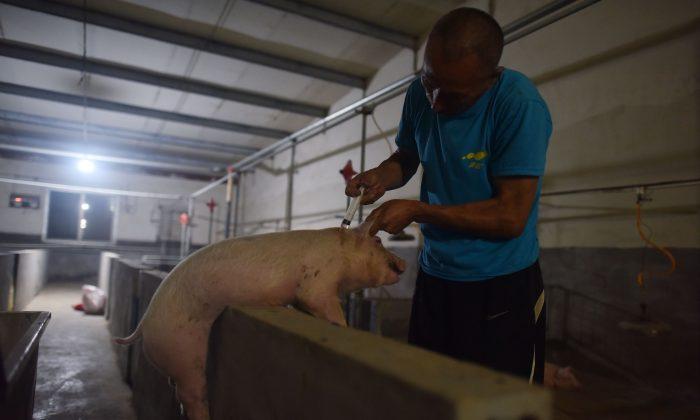China’s 400 million pigs may soon be forced to go on a diet.
The China Feed Industry Association (CFIA) plans to reduce the protein content in animal feed due to the effects the Sino–U.S. trade war has had on China’s supply of soybeans.
After the Chinese Communist Party (CCP) regime imposed a 25 percent retaliatory tariff on soybeans imported from the United States, the price of imported soybeans rose sharply, affecting feed production and the pork industry.
Imported soybeans are mainly used as a component of feed for livestock, poultry, and aquaculture. Even with the purchase of soybeans from Brazil and plans to procure more in Argentina and India, China still can’t keep pace with fourth-quarter demand, and Chinese processing plants may not be able to produce enough soybean meal.
The CFIA recently drafted two documents, one of which lists the upper limit of crude protein in pig feed. It recommends that the heavier the pigs, the less crude protein the feed should contain. In addition to pig feed, the association also plans to recommend a reduction of crude protein in chicken feed. The document is open for comments and revisions until Oct. 15.
The association also says that protein reductions could be compensated for by the addition of synthetic proteins.
Han Jun, deputy director of the Office of the Central Agricultural Work Leading Group and vice minister of Agriculture and Rural affairs, claimed during a press briefing on Aug. 9 that tariffs would only have a limited impact on China’s market.
However, reducing soybean meal in the feed is unlikely to compensate fully for the shortage of soybean imports. According to experts who gave anonymous interviews with Chinese media giant Sina.com, if the pig feed protein index is decreased by 2 percent on average, the demand for soybean meal can be reduced by 8 million tons and correspond to a total reduction of 10 million tons of soybeans.
According to Han Jun, the agricultural official, China has to import more than 90 million tons of soybeans per year. The United States is one of its biggest suppliers, providing about a third of China’s total soybean imports. Even if China can pare its demand by 10 million tons, it is still short by 20 million tons, not all of which can be imported from other sources.
Hamburg-based oilseeds analysts Oil World said in its latest newsletter, published Aug 7, that China will soon be compelled to resume buying U.S. soybeans: “The South American supply shortage will make it necessary for China, in our opinion, to import 15 million tonnes of U.S. soybeans in October 2018/March 2019, even if the current trade war is not resolved,” according to the newsletter.
A Chinese client for a major soybean crusher told Reuters on Aug. 29: “We can cover our demand until November. But for December and January, we are a little short of beans.” He estimated that China’s total purchases of U.S. soybeans in December and January would be at least 13 million tons.
China is the world’s largest producer and consumer of pork. In anticipation of soybean shortages, the price of pork has risen 26 percent this year. On Oct. 9 alone, the price rose 1.1 percent to 3,487 yuan ($504.9) per ton, the highest since July 2014. Soybean prices in some Chinese markets have risen almost 300 yuan ($43.44) per ton since July.
Sina quoted an industry insider as saying that, currently, U.S. soybean prices are cheap, and even if tariffs are added, the price would still be profitable. However, importing U.S. soybeans is currently a sensitive issue, so Chinese companies dare not import them for fear of political repercussions from the CCP regime.
Chinese consumers worry that pig farmers may, in lieu of healthy feed, add dubious ingredients to increase the weight of livestock.
Epoch Times staff member Lin Yan contributed to this report.





Friends Read Free